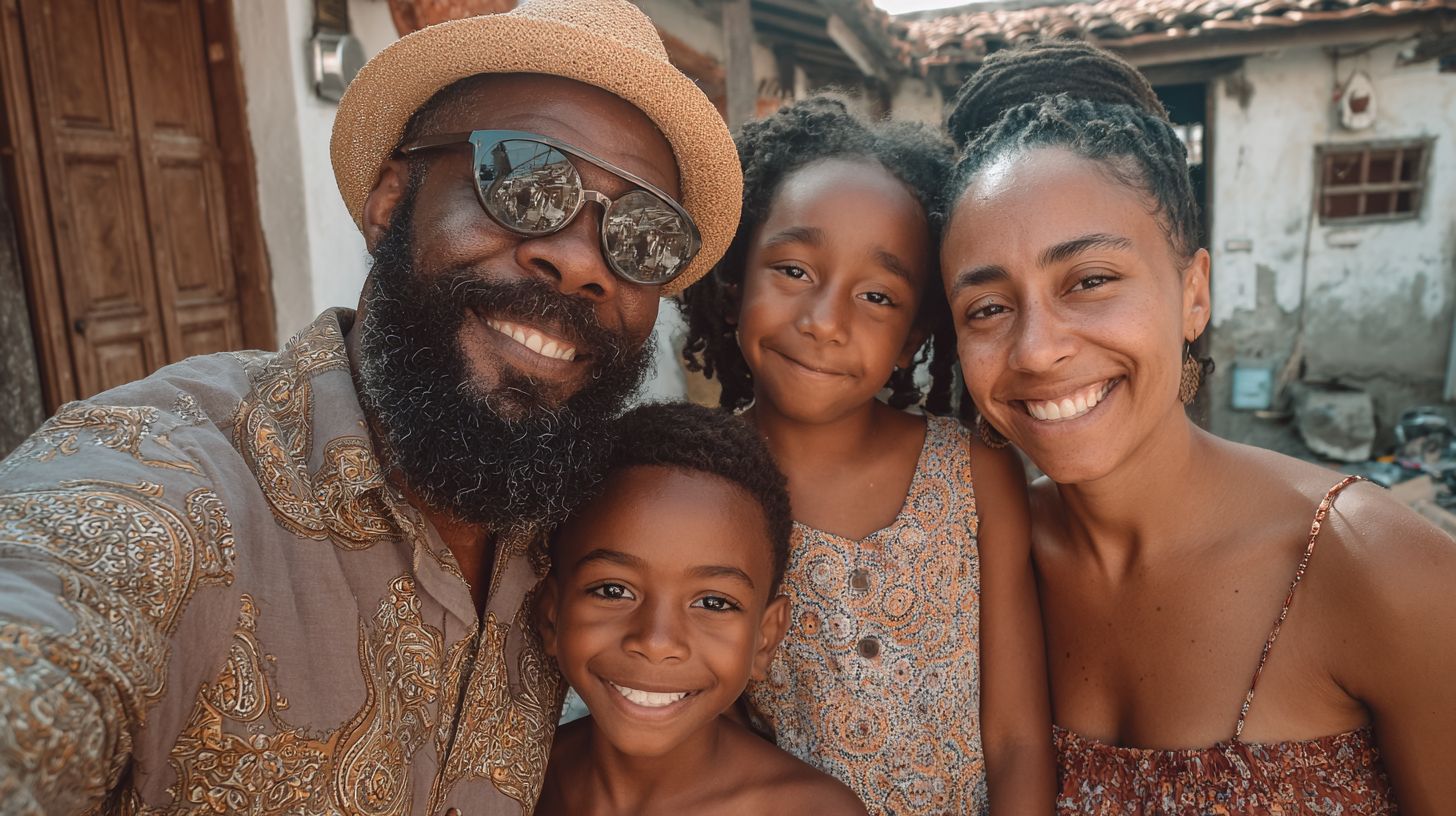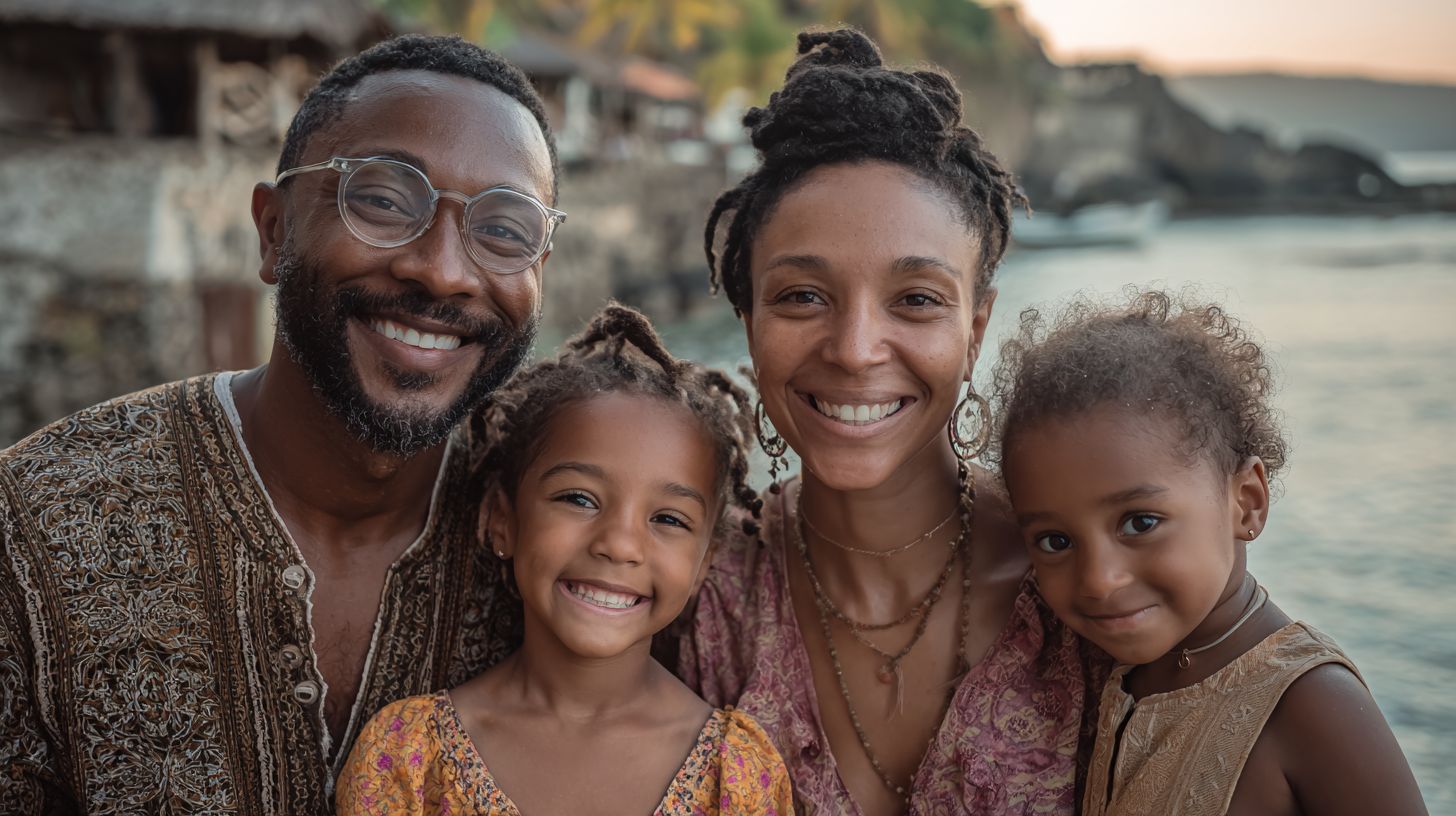Find Your Next $100K+ Remote Job
Work from anywhere and grow your career with Ladders Premium.
Premium members get access to thousands of $100K+ remote jobs from employers who value flexibility and high-performing talent. Plus, you get tools that give you the edge:
Apply4Me career experts who apply to jobs for you.
Keyword-based search to filter roles that fit your lifestyle.
AI-optimized resume to help you stand out in applicant tracking systems.
Whether you want more freedom, balance, or just the right role, Premium makes the search easier.

The Secret Fear Every Digital Nomad Parent Has (And How to Overcome It)
Let me tell you about the 3 AM panic attack I had in a Bali villa while my kids slept peacefully in the next room.
I'd been living the dream—beaches, temples, affordable massages—but suddenly my brain decided to throw a party of worst-case scenarios. What if they fall behind in school? What if they can't make friends? What if I'm ruining their childhood with my laptop lifestyle?
If you're a digital nomad parent (or thinking about becoming one), you've probably felt this gnawing anxiety in your gut. It's the fear nobody talks about in those Instagram posts of kids playing on Thai beaches.
The fear is this: "Am I being selfish? Am I sacrificing my children's stability for my own freedom?"
Spoiler alert: You're not alone. And there's a way through this.
Why This Fear Feels So Real
Here's the thing—this fear exists because you're a good parent. Bad parents don't worry about whether they're doing right by their kids. You're questioning yourself because you care deeply.
But let's be honest about what's really happening:
Society has programmed us to believe kids need a white picket fence, the same school for 12 years, and Little League every Tuesday
Our parents' generation didn't have this option, so we have no role models
We're comparing our behind-the-scenes chaos to everyone else's highlight reels
The stakes feel enormous because, well... they're our kids
The result? Guilt sandwiches for breakfast, lunch, and dinner.
The Truth Nobody Tells You
After six years of raising kids while bouncing between countries, here's what I've learned:
Your kids aren't fragile China dolls. They're resilient little humans with an incredible capacity to adapt. In fact, research shows that children who grow up in multiple cultures often develop:
Higher emotional intelligence
Better problem-solving skills
Greater empathy and cultural awareness
Advanced language acquisition abilities
Increased adaptability (which is basically a superpower in 2025)
But here's the real secret: Your kids will be fine if YOU are fine.
Children pick up on parental anxiety like Wi-Fi signals. If you're constantly stressed about whether this lifestyle is "working," they'll internalize that stress. But if you're confident, present, and intentional? They'll thrive.
The 5-Step Framework to Overcome This Fear
Step 1: Define Your Non-Negotiables
Grab a notebook (yes, an actual notebook—humor me) and answer these questions:
What does my child absolutely need to feel secure and loved?
What educational outcomes matter most to me?
What family traditions or routines are sacred?
Pro tip: "Living in one place for 18 years" probably isn't on this list once you think deeply about it.
Step 2: Build Your Support Infrastructure
You need a village, even if that village is digital and scattered across time zones.
Essential resources:
Online schooling platforms: Outschool (https://outschool.com), Khan Academy (https://www.khanacademy.org), Time4Learning
Worldschooling communities: Worldschoolers Hub (https://www.worldschoolers.community), local Facebook groups
AI tutoring tools: ChatGPT for homework help, Duolingo for languages, Photomath for math problems
Mental health support: BetterHelp (offers kids/teen therapy), Talkspace
Action step: Join at least two online communities for nomad families this week. Just lurk if you want—you'll realize you're not alone.
Step 3: Create Anchors, Not Roots
Kids don't need the same physical location to feel stable. They need consistent anchors:
Daily anchors might include:
Morning routines that travel with you (pancake Sundays, bedtime stories, game night)
Regular video calls with grandparents
A special stuffed animal or blanket that goes everywhere
Family movie night every Friday, no matter which country you're in
Educational anchors:
Consistent online curriculum
Same learning schedule (even if the timezone changes)
Regular check-ins about their feelings and experiences
Step 4: Involve Your Kids in the Process
This is HUGE. When kids feel like active participants rather than passengers, everything changes.
Try this:
Let them help choose destinations (even if it's just between two options you've pre-selected)
Give them a "budget" for activities in each location
Ask them to research one cool fact about your next destination
Create a family travel journal that they can contribute to
Let them lead conversations with new friends (even if it's broken Spanish or hand gestures)
Bonus: Use AI tools like ChatGPT to help them create presentation projects about places you've lived. "Hey ChatGPT, help me make a fun presentation about the culture of Vietnam for my 8-year-old to share with grandparents."
Step 5: Implement the "Check-In System"
Every month, have a family meeting. Ask each person (including yourself):
What's been the best part of this month?
What's been the hardest?
What's one thing we should change?
On a scale of 1-10, how are you feeling about our lifestyle?
Important: If your kid consistently rates below a 6, it's time to adjust. Maybe that means slowing down, picking a home base for 6 months, or enrolling them in a local school for a semester.
This isn't failure—it's responsive parenting.
The Permission Slip You're Looking For
Here it is, in writing:
You are allowed to want an unconventional life.
Your kids can have a magical childhood in Lisbon, Chiang Mai, or Mexico City.
Choosing freedom and adventure doesn't make you a bad parent—it makes you a brave one.
The secret every experienced digital nomad parent knows? There's no perfect answer. Kids who grow up in suburban Nebraska have issues. Kids who grow up traveling have different issues. Every childhood has challenges.
The question isn't whether your kids will face difficulties—it's whether you're teaching them the skills to handle those difficulties with confidence and curiosity.
Your Next Step
Stop waiting for permission. Stop waiting for certainty. Stop waiting until you have it all figured out.
Start with a one-month trial in a nearby country. Book an Airbnb, pack the laptops and the kids, and just... go. You'll learn more in 30 days of doing than in 30 months of planning.
And on those nights when the fear creeps back in (and it will), remember: Your children are watching you choose courage over comfort. That's a lesson worth more than any traditional education could ever provide.
Now, if you'll excuse me, I need to figure out what time zone my kids' math tutor is in. The glamorous life continues.
Have questions about specific aspects of nomadic parenting? Drop them in the comments. I've probably faced (and survived) whatever you're worried about.
You're One Decision Away From Everything
There's a version of your life where you're not reading this at your desk.
You're working from a sun-drenched café in Lisbon. Or a modern apartment in Playa del Carmen. Or wherever you want to be next month.
That version of you made one decision differently from the current you.
They stopped researching and started strategizing.
Here's What Most People Do Wrong
They spend months—sometimes years—collecting information. Reading articles. Watching YouTube videos and joining Facebook groups, and asking the same questions over and over.
Information isn't your problem. Decision paralysis is.
You don't need another blog post about "the best countries for digital nomads." You need someone to look at your situation—your income, your constraints, your goals—and tell you exactly what to do next.
What Changes in 60 Minutes
This isn't a sales pitch disguised as coaching. It's a focused strategy session where we:
Identify what's actually stopping you (it's rarely what you think)
Design the lifestyle that fits your needs (not someone else's Instagram fantasy)
Create your personalized roadmap (your exact next 3-5 moves)
Answer your specific questions (the ones keeping you up at night)
Give you absolute clarity (so you can finally move forward with confidence)
No fluff. No pressure. Just strategic guidance from someone who's helped dozens of professionals exactly like you make this transition successfully.
The Only Question That Matters
A year from now, you'll either be living this life or still thinking about it.
The difference won't be courage. It will be one 60-minute conversation.
Most people who schedule this call tell me, "I wish I'd done this six months ago."
Don't be someone who says that six months from now.
Limited spots available each week. The professionals who take action first are the ones already booking their flights.
Your digital nomad life doesn't start when you board a plane.
It starts the moment you stop planning alone and start strategizing with someone who





